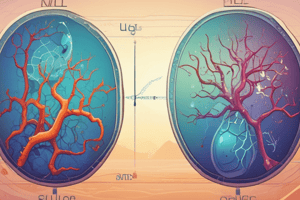Podcast
Questions and Answers
According to the metabolic theories of aging, what is the relationship between metabolic rate and aging?
According to the metabolic theories of aging, what is the relationship between metabolic rate and aging?
- Organisms with lower metabolic rates tend to experience faster aging
- Organisms with higher metabolic rates tend to experience faster aging (correct)
- Organisms with lower metabolic rates tend to experience slower aging
- Organisms with higher metabolic rates tend to experience slower aging
What are free radicals?
What are free radicals?
- Antioxidants that neutralize oxidative stress
- Important molecules that interact with DNA
- Reactive molecules that slow down the aging process
- Harmful byproducts produced during metabolic processes (correct)
What is oxidative stress?
What is oxidative stress?
- The production of harmful byproducts called free radicals
- The body's ability to produce more energy through metabolism
- The process of converting food into energy
- An imbalance between the production of free radicals and the body's ability to neutralize them (correct)
Which of the following statements best describes the relationship between metabolic rate and aging according to the metabolic theories?
Which of the following statements best describes the relationship between metabolic rate and aging according to the metabolic theories?
What are free radicals?
What are free radicals?
What is oxidative stress?
What is oxidative stress?
Flashcards are hidden until you start studying
Study Notes
Metabolic Theories of Aging
- Metabolic rate is inversely proportional to lifespan, meaning that a slower metabolic rate is associated with a longer lifespan.
- Higher metabolic rate generates more free radicals, which damage cells and contribute to aging.
Free Radicals
- Free radicals are unstable molecules that contain unpaired electrons.
- They are highly reactive and can damage cells by stealing electrons from them.
- Free radicals are a natural byproduct of cellular metabolism.
Oxidative Stress
- Oxidative stress occurs when the body's antioxidant defenses are overwhelmed by the production of free radicals.
- This leads to cellular damage, inflammation, and contributes to the aging process.
- Oxidative stress can be caused by factors such as pollution, UV radiation, and smoking, in addition to high metabolic rate.
Studying That Suits You
Use AI to generate personalized quizzes and flashcards to suit your learning preferences.




